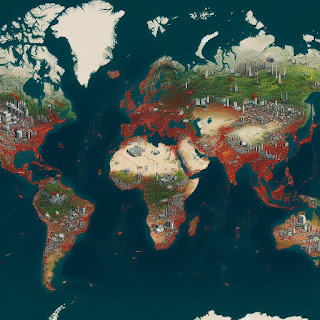The phenomenon of scaling, especially as it relates to businesses and technologies, has reshaped the contours of human civilization in profound ways. The following list hints at just a few ways scaling has impacted human progress.
- Geopolitical Implications: Scaling, particularly in the realm of technology, has given rise to superpower corporations whose influence rivals that of countries. Such entities, with their vast resources and global reach, have often become essential players in diplomatic circles, sometimes even mediating in geopolitical tensions. For instance, the rise of multinational corporations has led to a new form of diplomacy where trade and business interests often take precedence over traditional geopolitical considerations.
- Market Dynamics: Scaling has led to the formation of global markets, transcending traditional boundaries. While this has provided consumers with diverse choices and competitive prices, it has also posed challenges such as monopolies and the undermining of local businesses. The dominance of few scaled entities can sometimes stifle innovation and lead to market stagnation.
- Impact on Nations: The story of scaling is also the story of urbanization. As businesses scaled, they prompted massive urban migrations, leading to the rise of mega-cities. While such urban centers have become hubs of innovation and economic growth, they've also brought challenges like inequality, overcrowding, and environmental degradation.
- Wars and Peace: The scaling of industries, especially in the realm of armaments and technologies, has significantly impacted the nature of warfare. On the one hand, scaled production played a crucial role in World War II outcomes; on the other, the scaled proliferation of nuclear technology has led to deterrence strategies, arguably preventing large scale conflicts. Furthermore, economic interdependencies between scaled economies have often acted as a deterrent against conflicts, promoting negotiations and peace over war.
- Economic Impacts: The ability of companies to scale has been a significant driver of global economic growth. Scaled businesses contribute massively to GDPs, employ vast numbers of people, and spur innovations that drive economic progress. However, this has also led to economic disparities, both within and between nations. As certain sectors or regions scale rapidly, others that can't keep pace may face economic stagnation.
- Cultural Implications: As businesses and technologies scale, they also transport their native cultures with them. This has led to a blending of cultures in some cases and a homogenization in others. The global influence of scaled entities like Hollywood or major tech companies has sometimes overshadowed local cultures, leading to debates about cultural imperialism.
All of this is to suggest that the future will also present many new opportunities to scale. If we understand the phenomenon of scaling, then we will be in a better position to recognize these opportunities and to take advantage of them.
Read more on the historical and future impacts of scaling here.
*I use generative AI to assist in all my work.
************************************************************************
Kevin Benedict
Futurist at TCS
View my profile on LinkedIn
Follow me on Twitter @krbenedict
Join the Linkedin Group Digital Intelligence
***Full Disclosure: These are my personal opinions. No company is silly enough to claim them. I work with and have worked with many of the companies mentioned in my articles.



No comments:
Post a Comment